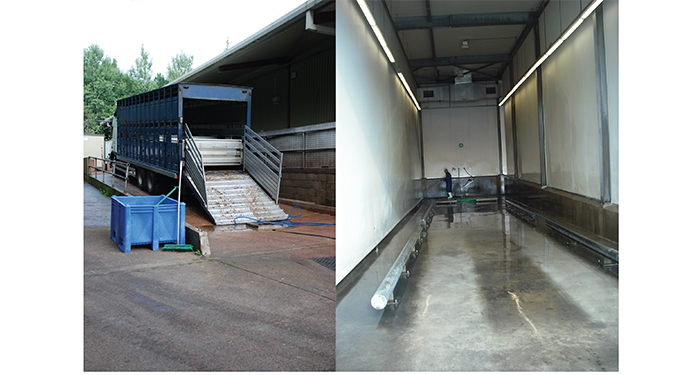Pig producers, processors and hauliers are being urged to ensure livestock lorries are properly cleaned, under a new campaign launched in response to the threat posed by African swine fever (ASF) and other diseases.
The #MuckFreeTruck campaign will encourage producers, processors and hauliers to do everything they can to keep lorries clean.
ASF is currently causing huge problems in Asia and the virus is present in many countries across Eastern Europe. With infected meat now regularly being detected at airports around the world, it is possible that ASF could already be in the country.
Research has shown that contaminated lorries that have not been cleaned properly play a huge role in spreading the disease, said NPA chief executive Zoe Davies, who came up with the idea and worked with AHDB to bring it to life.
The campaign – which will involve a number of industry bodies, including the NPA, AHDB, the British Meat Processors Association, the Pig Veterinary Society, British Pig Association and Red Tractor – is not just about ASF.
Over the past few months there has been a spate of swine dysentery cases confirmed on farms across the country, including more cases in North Yorkshire in early April. Some of the outbreaks have been linked to contaminated vehicles.
“The campaign will stress how important it is for producers, processors and hauliers to take every precaution possible to prevent dirty lorries entering farms and leaving processing plants,”
Dr Davies said. “Ideally, we want farmers to turn away dirty wagons and ensure their own are properly cleaned. Processors must ensure their lorries leave the site clean, while hauliers have a big part to play, including reporting any issues with lorry- washing facilities.”
Producers and allied businesses are also being urged to sign up to AHDB’s Significant Diseases Charter, if they haven’t done so already, and to familiarise themselves with AHDB’s lorry-washing Standard Operating Procedure.
“There is no point becoming good at biosecurity once disease has hit the country – by then it is too late. People need to be thinking about good biosecurity now,” Dr Davies told the NPA’s spring regional meetings in April.
Writing in the May issue of Pig World, AHDB’s Lauren Dimmack said: “Don’t be afraid to challenge a dirty lorry. If it’s not clean on the day, you can turn it away!”
The NPA is also calling for the Government to ramp up checks for illegally imported meat at airports and ports.
Why lorry washing is so important
Modelling work has highlighted how difficult it would be to detect African swine fever (ASF), if it got into the UK pig population.
The work, carried out at the Roslin Institute as part of Scotland’s EPIC research programme into animal diseases, also highlights the role contaminated lorries can potentially play in spreading disease.
The ASF virus is a ‘slow burner’, with symptoms that are not always easy to detect. Based on data from outbreaks in Georgia, pigs usually take about 13-17 days and are infectious for half that time.
When disease gets into the country, even with surveillance in place, Russian cases have shown it can take 32 days on average to detect outbreaks, with the first index case taking longer at around 40 days.
Modelling, using real eAML2 pig movement data and accounting for local spread, showed how the virus could spread across the country in weeks if it got into the key pig-producing areas.
When haulage companies were not factored in, the predicted ASF epidemic size was between nine and 193 infected premises. But when potential vehicle contamination was added in, this rose to between 118 and 775 premises.
“We have a large variation in standard of lorry-washing facilities in the UK and compared to some countries, there is much to improve,” NPA chief executive Zoe Davies said.
“The research showed that even if you are only transporting pigs to slaughter and abide by all the standstill regulations, you are still at risk. The longer that lorries are left contaminated, the quicker disease will spread. A single day of contamination reduces by half the effectiveness of all biosecurity efforts to prevent epidemic spread.”




